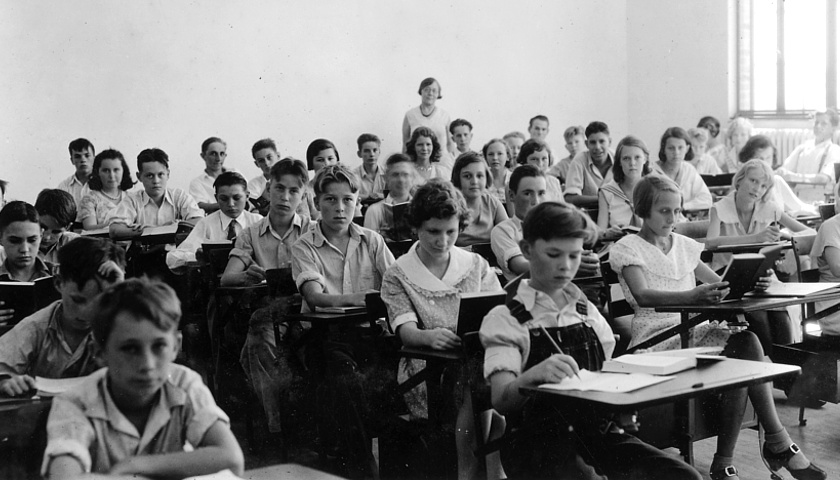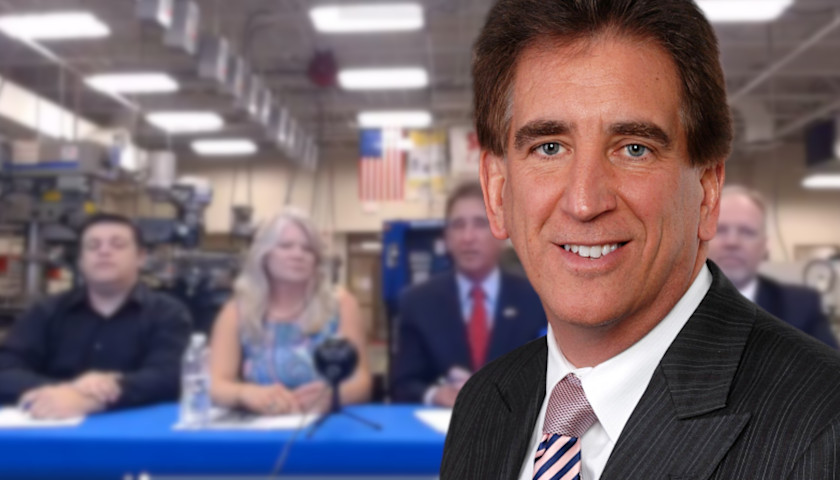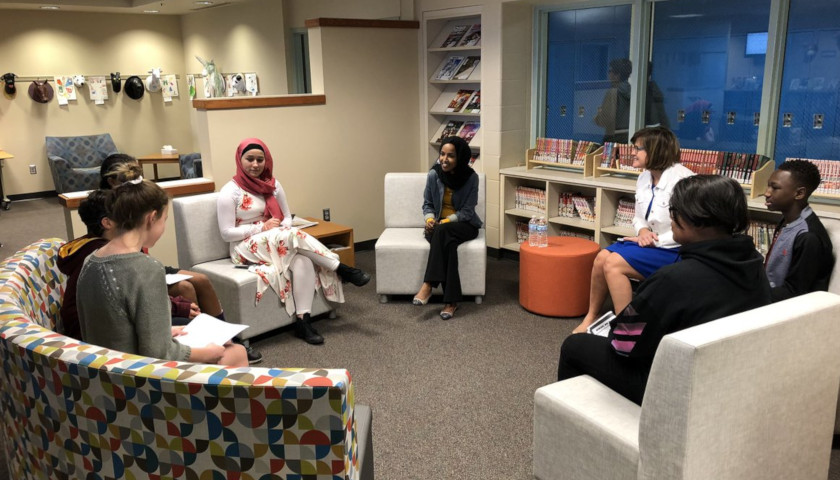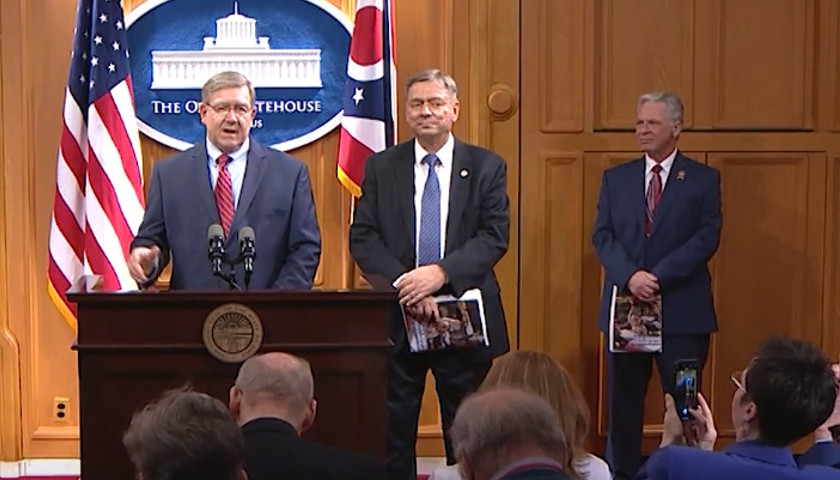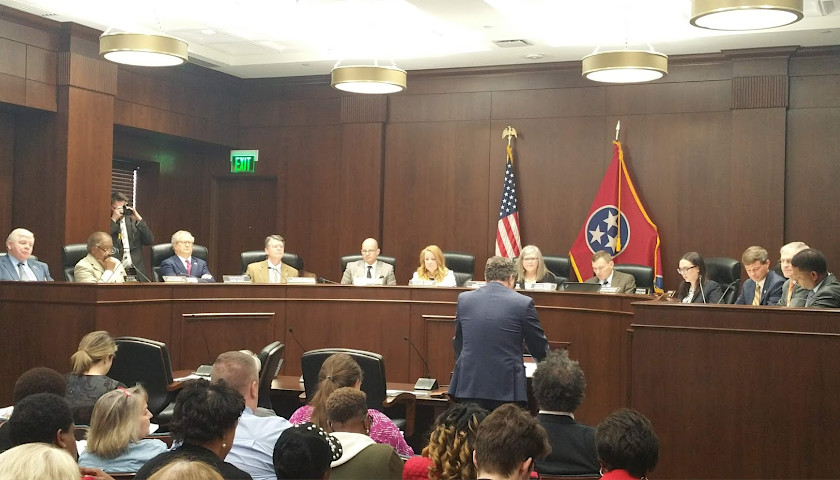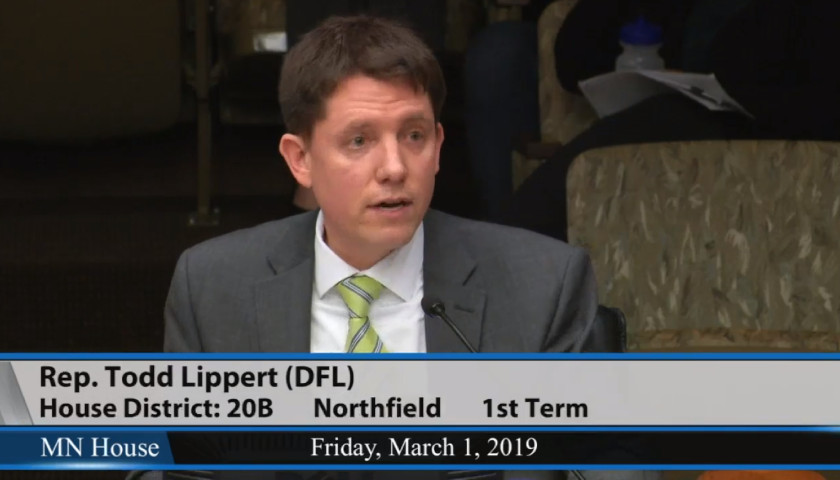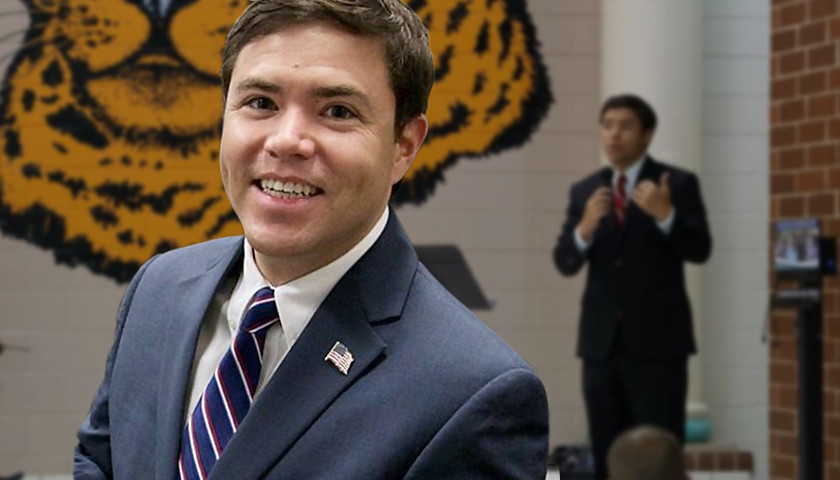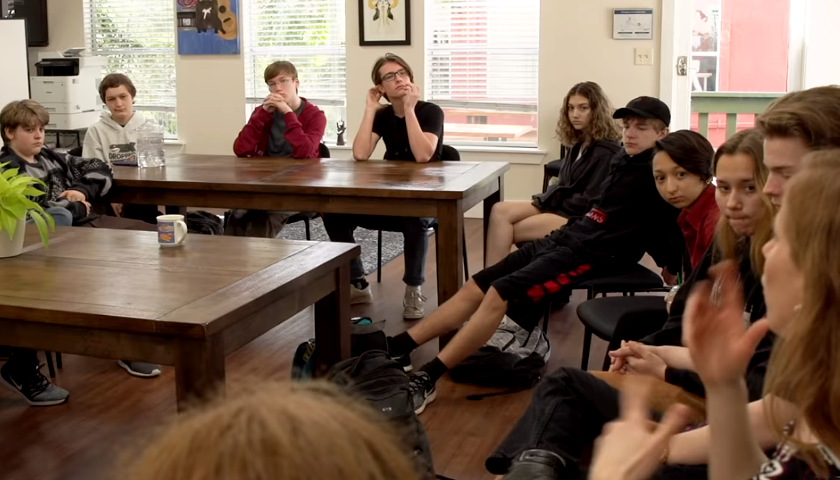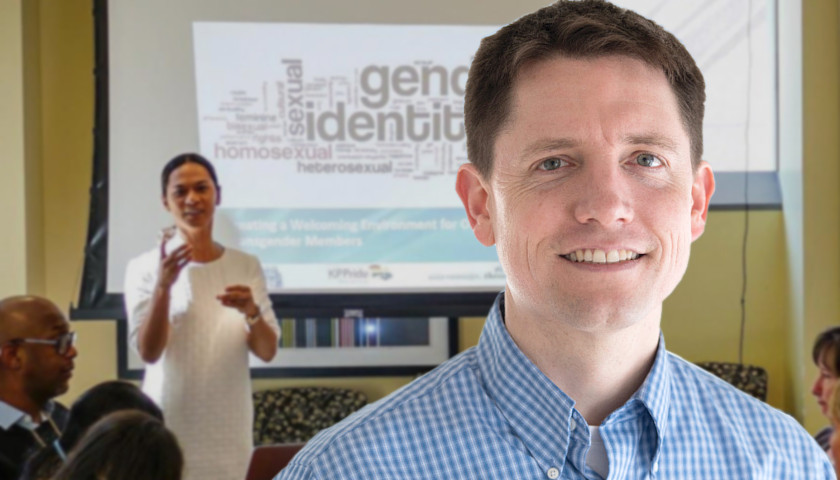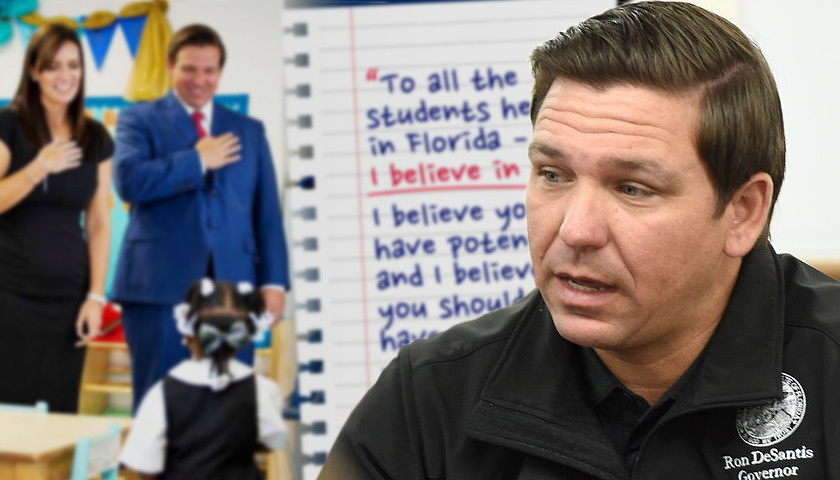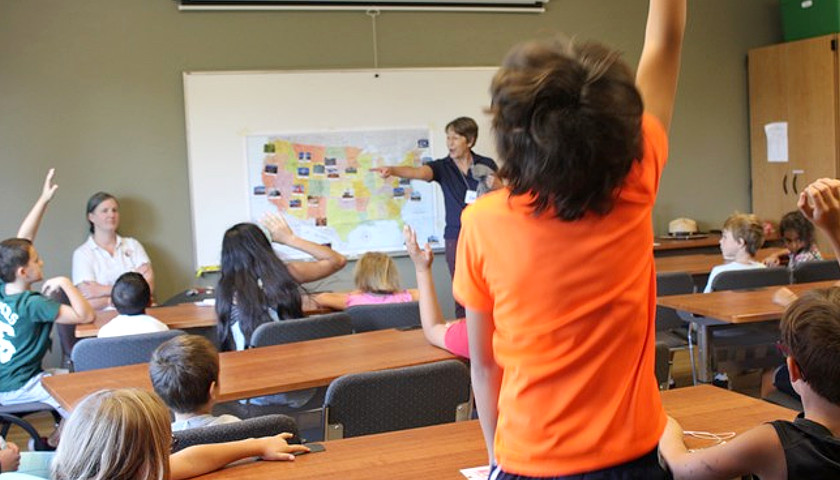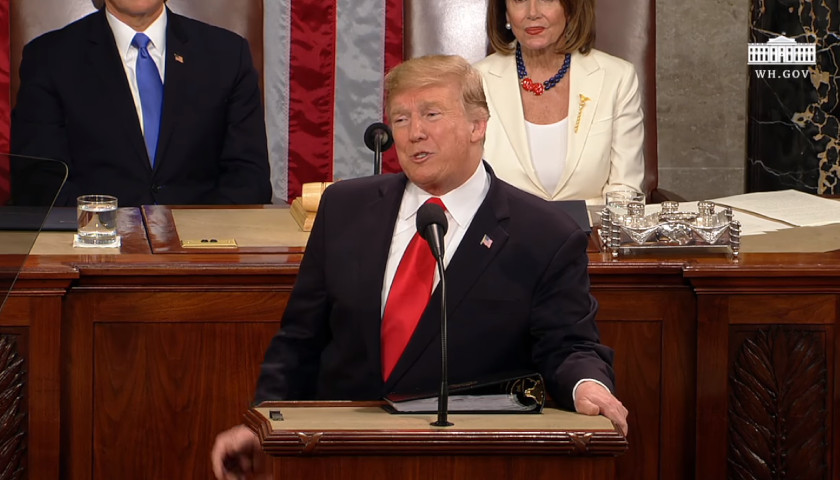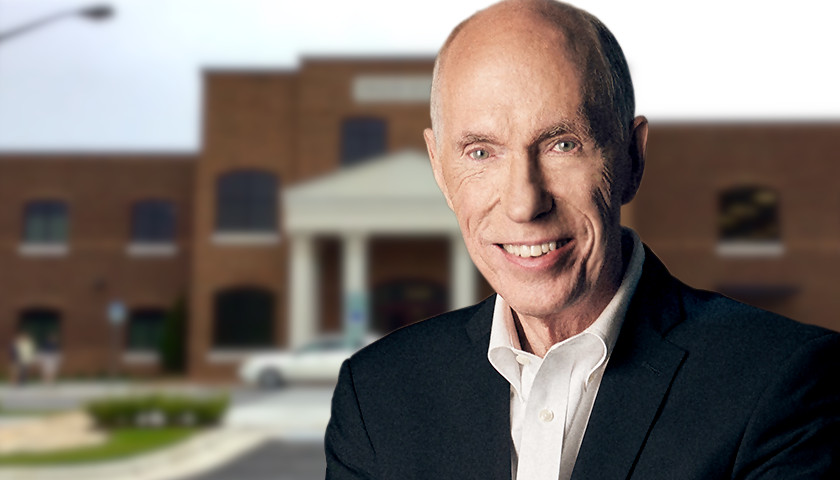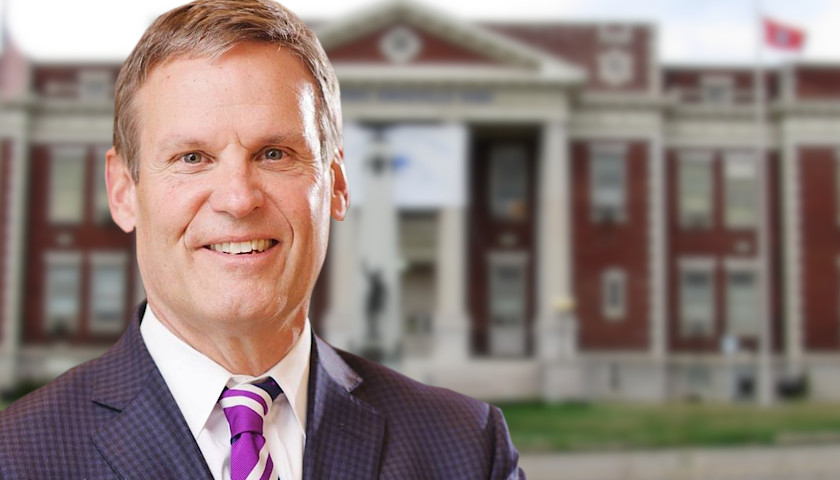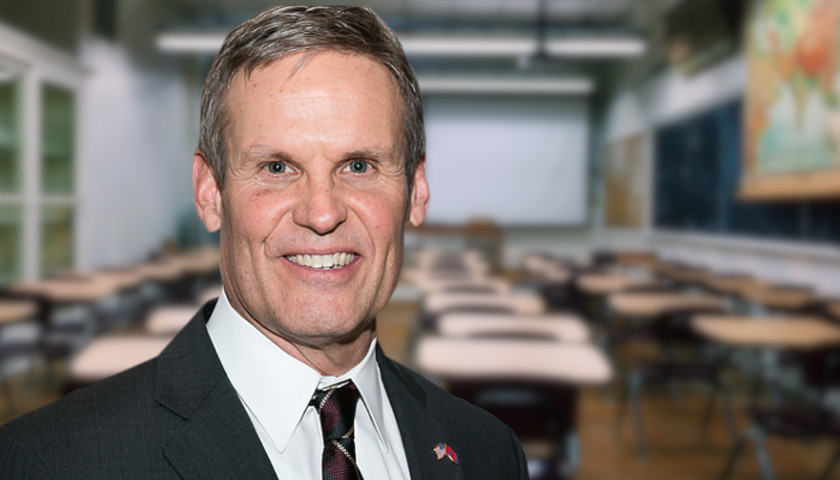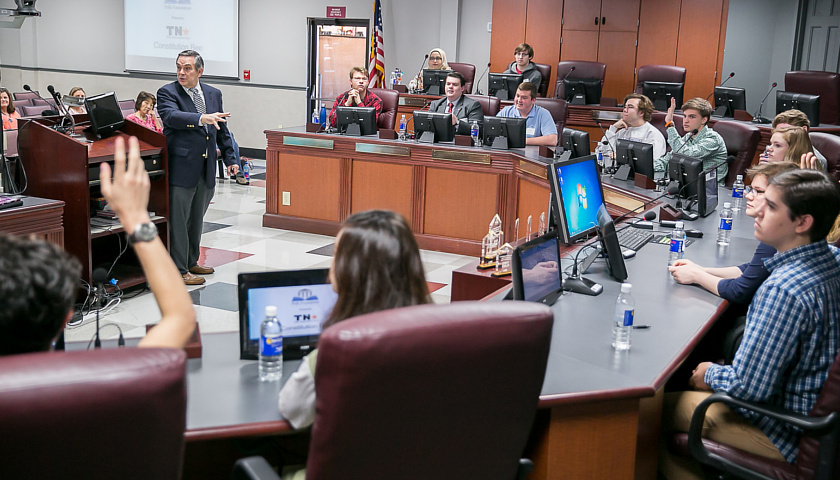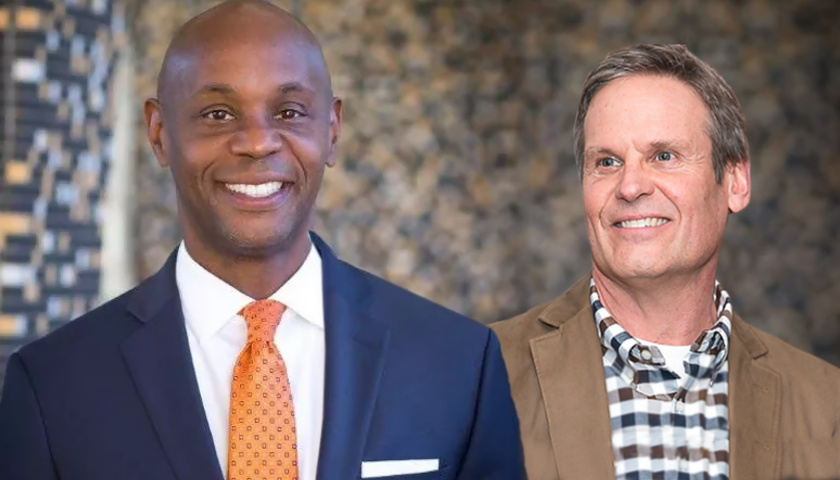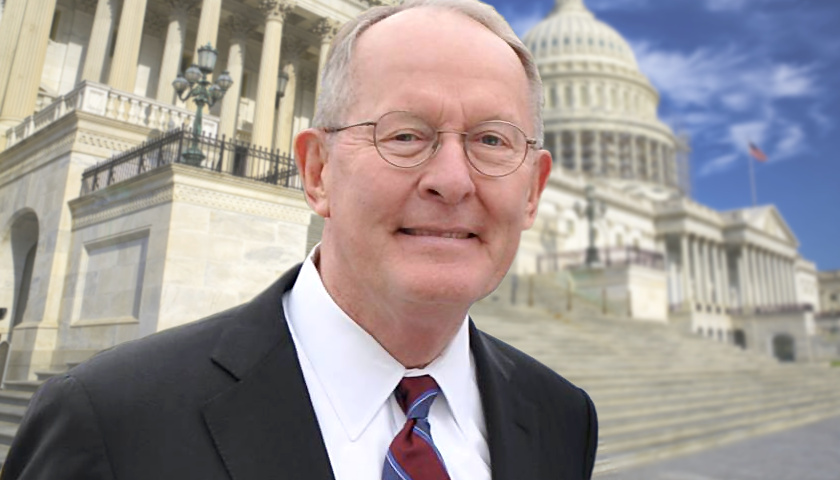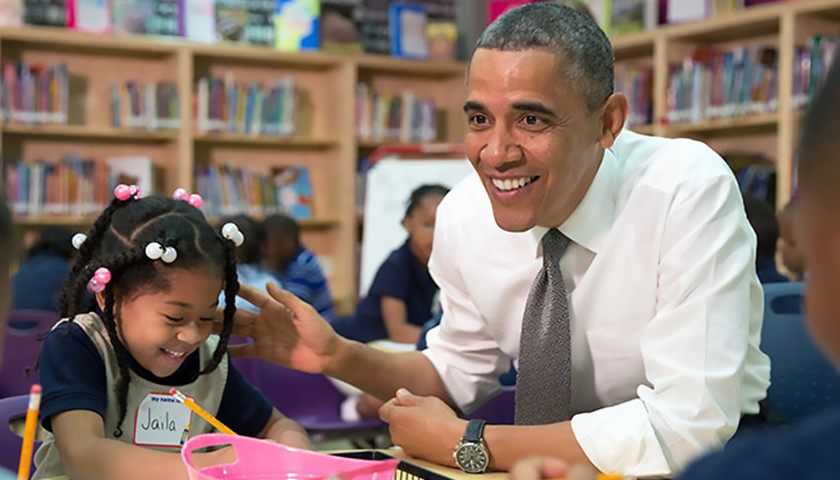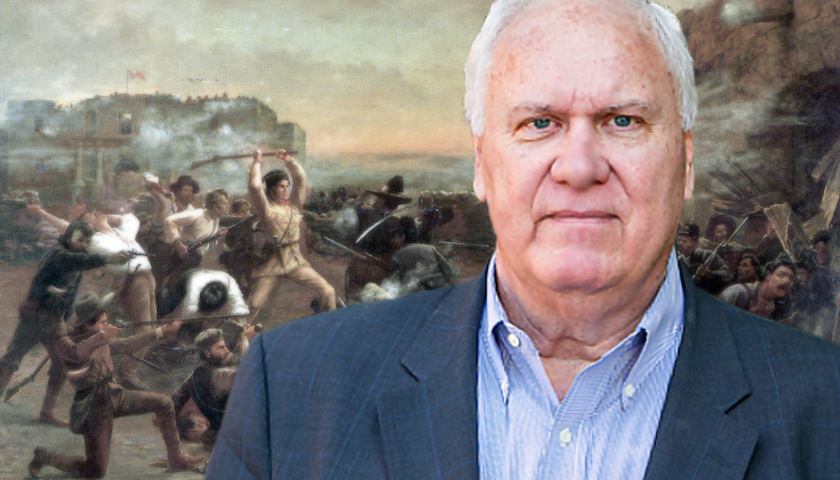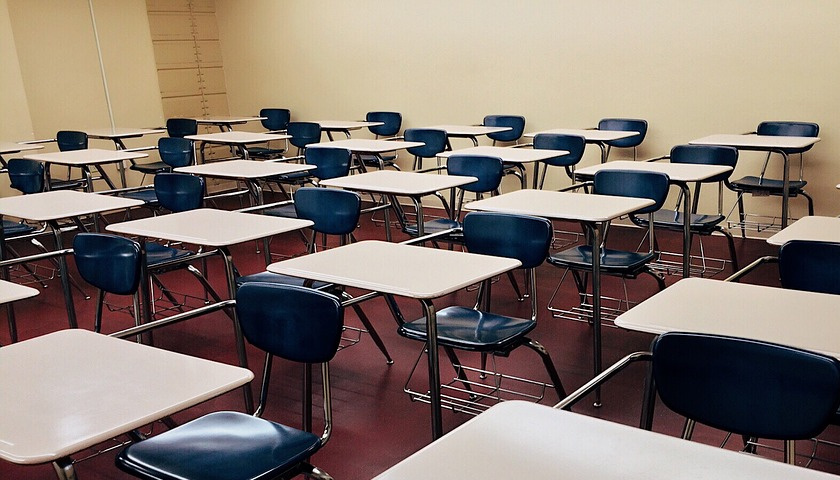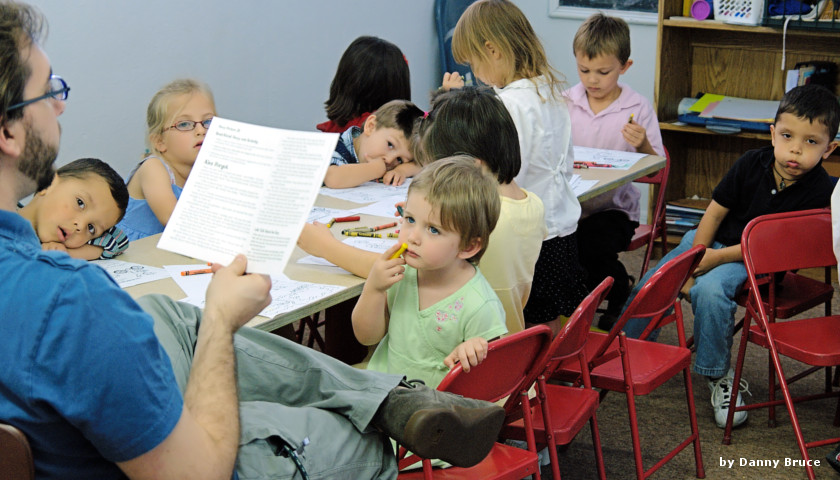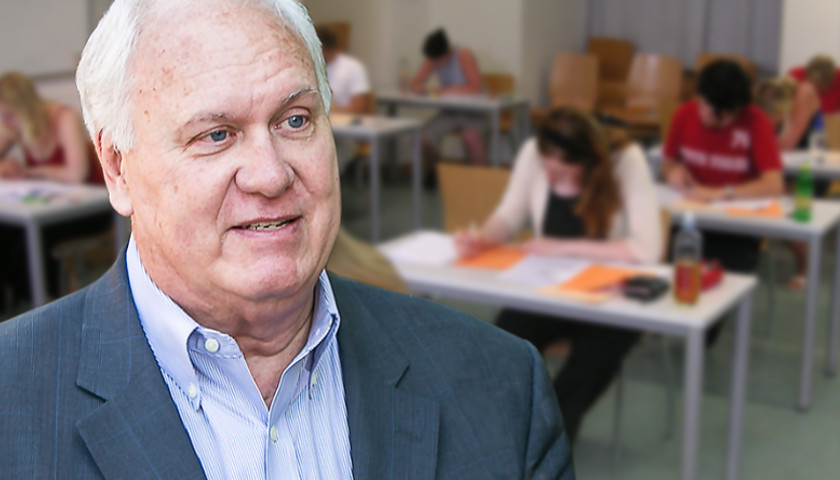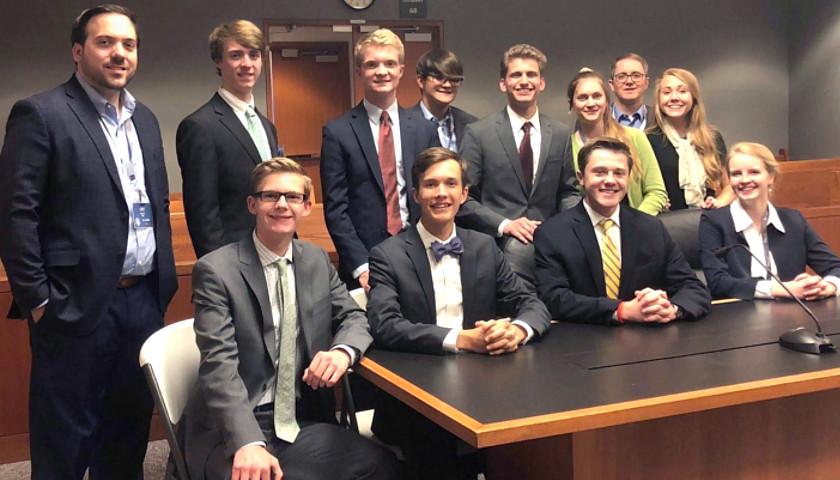The Ohio House is currently considering a bill that would reduce the number of state-mandated standardized tests students are required to take by eliminating four end-of-course exams, including the American history and American government exams. House Bill 239, referred to as the Testing Reduction Act, was introduced by Reps. Gayle Manning (R-North Ridgeville) and Erica Crawley (D-Columbus), and is scheduled to receive its third hearing Tuesday in the House Primary and Secondary Education Committee. “During my 37 years in an elementary school classroom, I experienced first-hand how stressful standardized testing can be for students. In order to prepare students for the standardized test, teachers often give local diagnostic assessments. I believe so much weight is placed on a score of a standardized test, and creativity in the classroom is dwindling. Every student is different and not every student will excel on a standardized test,” Manning said when testifying on the bill. In 2012, the Ohio Legislature passed into law Senate Bill 165, which required schools to teach America’s founding documents, like the U.S. Constitution, the Declaration of Independence, and the Bill of Rights. In her testimony, Manning maintained that these documents will still be taught even if the American…
Read the full storyTag: education
The History and Results of America’s Disastrous Public School System, Part I
by Mike Margeson and Justin Spears While it’s almost universally understood that the American school system is underperforming, “reform,” too, is almost universally prescribed as the solution. Yet in other walks of life, bad ideas are not reformed – they are eliminated and replaced with better ones. Our school system is rarely identified as a bad idea. The system is reflexively left alone while the methods are the bad ideas that get cycled in and out: open concept schools, multiple intelligences, project-based learning, universal design for learning, merit-based pay, vouchers, charters, and most recently, educational neuroscience. Every decade or so we are told by the pedagogic experts that they have found an answer to our school’s problems. The trouble is, they’re looking right past the problem. Schooling Monopoly The problem is the monopoly that schooling has gained over education. According to the National Center for Education Statistics, approximately 97 percent of kids go through traditional schooling (as opposed to homeschooling or unschooling), and just over 90 percent of those attend government schools. That is to say, there is basically one accepted way to educate kids today: school them. Given the relatively poor performance of American students on international achievement tests, you would think schooling might…
Read the full storyConservatives Tackle ‘Stigmas’ Surrounding Vo-Ed in Ohio
Ohio’s Future Foundation, chaired by former Congressman Jim Renacci, hosted a forum last week on the stigmas and misconceptions surrounding vocational education programs. The forum was hosted at Pioneer Career and Technology Center, whose superintendent said that skilled welders who graduate from the school can “easily make six figures just a few years out of high school.” “They’re hundreds of thousands of dollars ahead in just a few years,” said Greg Nickoli, who noted that graduates enter the workforce making $18 to $20 an hour. “One of the big misconceptions is that you’re going to go right in to work and it’s probably going to be a low-paying job. And I can tell you there’s nothing further from the truth,” he continued. “I would venture to say that most college graduates would jump at a chance to make $60,000 a year.” He also stressed that vo-ed graduates aren’t burdened with the debt that comes from a traditional four-year degree. That’s why Renacci and Ohio’s Future Foundation are spreading the word about vocational education opportunities in Ohio. “It’s something we believe needs to be prioritized in our state. We need to make sure that our high schools can continue to…
Read the full storyCommentary: The ADHD Over-Diagnosis Epidemic Is a Schooling Problem, Not a Child One
by Kerry MacDonald Childhood exuberance is now a liability. Behaviors that were once accepted as normal, even if mildly irritating to adults, are increasingly viewed as unacceptable and cause for medical intervention. High energy, lack of impulse control, inability to sit still and listen, lack of organizational skills, fidgeting, talking incessantly—these typical childhood qualities were widely tolerated until relatively recently. Today, children with these characteristics are being diagnosed with, and often medicated for, Attention-Deficit/Hyperactivity Disorder (ADHD) at an astonishing rate. Early Schooling Contributes To Increased Diagnoses While ADHD may be a real and debilitating ailment for some, the startling upsurge in school-age children being labeled with and medicated for this disorder suggests that something else could be to blame. More research points to schooling, particularly early schooling, as a primary culprit in the ADHD diagnosis epidemic. Over the last several decades, young people are spending more time in school and school-like activities than ever before. They are playing less and expected to do more at very young ages. When many of us were kids, kindergarten was mellow, playful, and short with few academic expectations. Now, 80 percent of teachers expect children to learn to read in kindergarten. It’s not the teachers’ fault. They are responding to…
Read the full storyIlhan Omar Speaks to Elementary and Middle School Students Behind Closed Doors
Rep. Ilhan Omar (D-MN-05) was back in her home district Friday visiting students at elementary and middle schools throughout the area, but parents and press were allegedly not allowed to attend. On Thursday evening, ahead of Omar’s visit to St. Anthony Middle School in Minneapolis, conservative activist Alley Waterbury altered her followers on Facebook to a protest that would be occurring. “We must protect our children,” Waterbury said. “The school is asking for permission for their children to attend this event, but the parents are not allowed to attend themselves. This is a problem and no cameras.” “Lecturing our kids behind closed doors with no parents is a no go,” she later added. Waterbury and her fellow protesters contacted the school to express their concerns after Waterbury’s initial alert quickly spread on social media. “Thank you for your feedback. Congresswoman Omar serves as the U.S. Representative for the 5th Congressional District, which includes St. Anthony. We understand some members of our community did not vote for Congresswoman Omar. When our local, elected representatives reach out to learn about our schools and school district, we always open our doors,” Principal Amy Kujawski wrote to Waterbury in response. “Congresswoman Omar’s visit will…
Read the full storyCommentary: Teachers Unions Are Like Overbearing Mothers
by Daniel Buck Every year, the union reps make their rounds and talk to every teacher in the district. This year, my building’s representative sat in a student desk across from mine and asked if I had any feedback or thoughts I’d like to share. I summarized my discontent, to which she gave a thoughtful rebuttal. The conversation proceeded as expected – respectful but unfruitful. As she walked out, she apparently could not resist a quip: Since other teachers paid union dues, but I didn’t, she said, perhaps I should consider that I profit at my colleagues’ expense. That jibe is a common refrain in defense of unions. They provide a common good, the argument goes, defending worker rights and bargaining for compensation. Thus, I have an obligation to provide money from my paycheck. Another snide remark directed at me phrased it as “all the benefits I reap from the unions I so disdain.” It’s a deft little guilt-trip that crumbles with the slightest application of pressure. Needing to Be Needed In his book The Four Loves, while discussing familial love, C.S. Lewis provides a fictional anecdote that works to frame a rebuttal to this argument. I am thinking of Mrs. Fidget, who…
Read the full storyHandwriting Helps Kids with Learning Disabilities Read Better
by Faiza Elmasry As recently as a half-century ago, young American students would spend many lessons writing curved loops and diagonal lines, as they learned how to write in cursive. Over the years, though, computer keyboards and voice to text programs have replaced pens and pencils, and made handwriting – especially cursive – less relevant. But it hasn’t disappeared. St. Luke Catholic School in McLean, Virginia, still teaches cursive. Several times a week, students work on their handwriting skills, clutching their pencils and pens as they practice forming neat loops and curls. Teacher Grace O’Connor says eventually, all of them will have a style all their own. “The great thing about cursive is everyone has his own little spin to it, like, you know how to form your letters, but as you get older you, kind of, develop your own flow to your cursive writing, and it’s yours,” she says. “You can take ownership of it, which is really great.” Cursive engages multiple senses Cursive handwriting is emerging as a learning tool for students with dyslexia, a disorder that makes it difficult to read or interpret letters, words and other symbols. Thirteen-year-old Joseph was diagnosed with dyslexia four years ago,…
Read the full storyNew Ohio Bill Proposed to Overhaul Controversial ‘State Takeover’ of Local Public Schools
A new Republican-backed bill is being considered that would dramatically undo a major and controversial education initiative that was supported and signed by former Gov. John Kasich. In 2015, Ohio was facing an epidemic of failing schools. An Ohio Department of Education report for 2014-2015 found that only six of the 607 school districts received an “A rating,” while the majority averaged a “C.” In response to this growing epidemic, Kasich backed a controversial solution. The “Youngstown Plan,” as it’s called, established a system by which any school that receives consistently failing grades would immediately be taken over by a five-person “Academic Distress Commission.” This commission then appoints a “CEO,” who has “complete operational, managerial and instructional control of the district.” This authority includes the ability to hire or fire individuals at will, close schools and allocate funds. On June 24, 2015, House Bill 70 (HB 70) was rewritten, introduced, and passed by both the House and Senate in one day. It was signed later that year. At the time of its passage, a Kasich spokesperson stated the governor’s feelings: Gov. Kasich had been vocal about the need to improve the Youngstown School system in light of the fact that they had been failing for nearly 10…
Read the full storyCommentary: Why Can’t We Ask the Hard Questions About Education?
By Andrew I. Fillat and Henry I. Miller Retired teacher Mary Hudson recently wrote a damning exposé based on her experiences in the New York City public school system. Hudson taught in three different public high schools and her observations from those years lead her to implicate the students and a “go along to get along” attitude among administrators for persistently poor educational performance. Put simply, administrators are unwilling to set high educational and behavioral standards for fear of having to confront underperforming and disruptive students. They have few implements their toolbox to permit such confrontation. As a result, students feel diminished and take advantage of lax standards to dismiss the educational aspect of school. Peer pressure and even physical intimidation deter the few students who are interested in learning and effectively this turns schooltime into social time. Administrators respond by treating classes like day care, often to the chagrin of teachers. This is “the soft bigotry of low expectations” epitomized. The net result is a student body hostile to direction, discipline, and learning. This problem is exacerbated by the “social justice” and politically correct mindset that makes discipline, both behavioral and educational, subject to racial quotas. (Woe to…
Read the full storyOhio Legislators Applauded for Addressing ‘Seriously Flawed’ School Funding Formula, But Questions Still Remain
After 15 months, a bipartisan workgroup unveiled its Fair School Funding Plan to overhaul Ohio’s school-funding formula, but some still had questions about how it will accomplish what Ohioans need. Reps. Bob Cupp (R-Lima) and John Patterson (D-Jefferson) spearheaded the workgroup along with superintendents and educators from across the state, and announced their findings during a Monday press conference. “We are excited because we’re here to announce the release of the School Funding Workgroup’s recommendations for comprehensive redesign of Ohio’s primary and secondary school funding framework,” Cupp said, calling the new funding plan “fair, more predictable, and more workable.” “It’s widely recognized that our current funding formula, forged in the last recession, is seriously flawed. Experience has shown that it’s not any longer even functioning as a formula,” he continued, saying the current funding formula is “more a patch than a formula.” At the start of the 15-month process, the School Funding Workgroup was charged with considering “what our students truly need to succeed in this rapidly changing world, and to develop recommendations to meet those needs that are fair to Ohio’s kids, school districts, and taxpayers.” “Over four-fifths of districts are either on a cap, which limits the funding…
Read the full storyJoe Carter Commentary: Make America Smart Again
by Joe Carter Over the past week America has been fascinated and appalled by the latest college admissions cheating scandal. Much of the attention has been focused on the bribing of coaches to get kids into school with fake athletic credentials. But the even more absurd part of the scandal is that parents were paying between $15,000 and $75,000 per test to help their children get a better score on the SAT. The parents seem to believe that the SAT was a mere hurdle to be overcome by whatever means necessary. Once the child was admitted to the college, they would be swept along into a life of wealth and prestige. That’s not entirely wrong, of course. As economist Bryan Caplan says, “If you can get your less-than-brilliant, less-than-driven child admitted, he’ll probably get to impersonate a standardly awesome Ivy League graduate for the rest of his life.” It’s true there’s a correlation between scoring well on the SAT and getting into a good college, as well as a correlation between a college degree and social mobility. But the cheating parents seem to think there is a direct line between “score well on the SAT” and “economic security.” The reality is the…
Read the full storyCivics and School Choice Elements of Governor Bill Lee’s Education Agenda Make Their Way Through the State House
NASHVILLE, Tennessee – Elements of Governor Bill Lee’s focus on education, which he talked about on the campaign trail, his inaugural address and more recently in his first state of the state address, including an emphasis on parents having more school choice as well as civics education and “unapologetic American exceptionalism,” are making their way through the State House committee process. “Administration bills,” as they are called, are those that are initiated by the Executive Branch of the state government. That could be the Governor as the chief executive, or any of the numerous state departments within the executive branch. It is one role of the Majority Leader of each legislative body to be the primary sponsor of an administration bill, which would be Senator Jack Johnson (R-Franklin) and Representative William Lamberth (R-Cottontown) in the Senate and House, respectively. As House Majority Leader Lamberth explains it, the bills are most often “carried” by another member in the House, although, in his role, he would ensure that the administrative process is properly executed. Generally, the first co-prime sponsor of a bill in the House would be the Assistant Majority Leader, in this case, Representative Ron Gant (R-Rossville). In the case of…
Read the full storyKnox County Schools Spending $170,000 on ‘Cultural Competency’ In-Service Training for Teachers and Staff This Year
Knox County Schools are spending $170,000 out of their $928,677 in-service budget on “cultural competency” training for teachers even as the Williamson County School System uses increased expenditures to tell white teachers they are over-privileged. Knox County’s Fiscal Year 2019 expense is in the KCS General Purpose School Fund, under “Disparities in Education Outcomes.” The “In-Service/Staff Development – Schools,” is located under the “Other Expenses” line. The note for the $170,000 line item specifies, “Cultural Competency training.” The school budget details are here. Another note on the page, E-6, says, “The Disparities in Education Outcomes programs is a district initiative aimed at eliminated education disparities. The FTEs contained in this program are Restorative Interventionists. Also included in this program are resources for Cultural Competency training and supplies needed to support the program.” The overall Disparities in Education Outcomes budget for FY 2019 is $1,533,099. Knox County Schools’ general fund budget for 2019 was $484.5 million, an increase of $13.4 million from the previous year, according to the FY 2019 Knox County budget. The overall in-service training budget for FY 2019 is $928,677, a 4.2 percent decrease from the previous year total of $918,635. In 2016, a school board task force…
Read the full storyThe Tennessee Star Report: Justin Owen from the Beacon Center Talks About Governor Lee’s Plan to Reform the Tennessee Criminal Justice System
In a specific discussion on Monday morning’s Tennessee Star Report with Steve Gill and Michael Patrick Leahy – broadcast on Nashville’s Talk Radio 98.3 and 1510 WLAC weekdays from 5:00 am to 8:00 am – host Steve Gill talked in depth with the Beacon Centers CEO, Justin Owen about the Beacon’s support of Bill Lee’s criminal justice reform proposal and the implications of offering non-violent criminals a chance to receive education and enter the workforce instead of returning back through the prison’s revolving doors. The men ended the segment covering the aspect of vocational training reform and it’s implementations effect on Texas. Gill: Justin Owen is the President and CEO of the Beacon Center and here to explain what is the rationale for the support that the Beacon Center is giving to, among other things the college for criminals plan that Governor Bill Lee is putting out. And Justin good to have you with us. Owen: Good to be on Steve, thanks for inviting me on. Gill: A lot of stuff on this issue. The Governor hadn’t put out a lot of details, they’ve not answered questions that we’ve submitted to them about how much it’s going to cost and…
Read the full story‘Genderqueer Non-Binary Panromantic Asexual’ High School Student Testifies in Favor of New Minnesota Sex-Ed Requirements
The Minnesota House Education Policy Committee held its first hearing Friday for a bill that would require public-school teachers to discuss “healthy relationships, including relationships involving diverse sexual orientations and gender identities in the classroom.” Rep. Todd Lippert (D-Northfield), a freshman House member and lead sponsor of the bill, said Friday that his legislation would create “instruction that is medically accurate and developmentally appropriate in regards to human anatomy, reproduction, and sexual development.” “But it is also time for us to teach a culture of consent and bodily autonomy—giving our youth the tools they need to be treating themselves and others with respect, giving our youth the tools they need to build healthier relationships and in time, healthier families,” said Lippert, who is an ordained minister in the United Church of Christ. “It is also time that we recognize in school curriculum that our youth and their families are diverse when it comes to sexual identity.” As The Minnesota Sun previously reported, his bill would require the commissioner of the Minnesota Department of Education to develop “one or more model comprehensive sexual education programs for elementary and secondary school students.” This “model program” must include instruction on “consent, bodily autonomy, and healthy…
Read the full storyGov. Bill Lee Announces Criminal Justice Reform Proposal, May Include Free College Education for Felons in Prison
“Free” college education is all the rage, and now it appears that felons are joining in as Gov. Bill Lee proposes to use taxpayers’ money to pay their way to a degree. Lee’s plan could join other “free” education programs. In December Metro Nashville announced a program to spend millions per year offering “free” college to select students, building on similar programs like Tennessee Promise and Tennessee Reconnect. Lee on Thursday announced a number of changes to the criminal justice system leading up to his State of the State address on Monday. A press release on his plan is here. “We must significantly improve public safety in our state and I believe that starts with our criminal justice system,” Lee said in the press release. “We will focus on helping individuals to ensure there is a pathway to a productive life beyond crime and ultimately make our state a safer place.” Laine Arnold, Lee’s press secretary, did not reply to questions asking these questions: What is the total cost to implement the criminal justice reforms? Will the inmates pay anything? How much will taxpayers pay for the bachelor’s degree program at Turney Center Industrial Complex and high school education? Lee’s…
Read the full storyNorth Carolina Superintendent of Schools Rolls Out ‘NC 2030’ Plan
Last week, North Carolina Superintendent of Schools Mark Johnson rolled out “NC 2030,” which is a plan to make the state the “best place to learn and teach by 2030.” “By 2030, North Carolina can be the best place to begin school, the best place to learn and the best place to teach,” Johnson said in a press release. “Today we present an ambitious but achievable plan to get there. Our educators are doing their part. It will take innovation and leadership to make it happen.” The NC 2030 plan will be measured by increasing activity in four areas: Expanding Pre-K opportunities for 4-year olds Fourth graders reading on grade level Students who, after graduation, are on track to their chosen, fulfilling career Recruits to education professions and educators remaining in N.C. public schools Increasing pre-k slots, reducing testing, increasing so-called ‘personalized’ learning, and an emphasis on “Career pathways” were included in the detailed list of Johnson’s legislative priorities. Missing from NC 2030 is the full discontinuation of the Common Core State Standards, which Johnson campaigned on in 2016. What Johnson does suggest is dismantling just the use of Common Core Math: Allow a working group of districts to opt out…
Read the full storyCommentary: Finally Some Schools Are Freeing Students from the Bonds of Mediocrity
by Annie Holmquist By now, many parents know there is something seriously wrong with the average American school. Time and again, children go into the school system as bright bundles of energy, curious about the surrounding world, and time and again, they stagger through the system frustrated and losing their interest in learning. Unfortunately, parents have firsthand knowledge of what former New York teacher John Taylor Gatto explained in his book, Weapons of Mass Instruction: “After a long life, and thirty years in the public school trenches, I’ve concluded that genius is as common as dirt. We suppress genius because we haven’t yet figured out how to manage a population of educated men and women. The solution, I think, is simple and glorious. Let them manage themselves.” That’s easy enough to say, but is it actually possible to do? A video from Reason suggests that it is possible, and in fact, is actually being done quite effectively. Host John Stossel travels to the Academy of Thought and Industry (ATI) to explore a school filled with kids who would likely be considered dysfunctional and troublemakers in the normal education system. Instead, Stossel finds a group of thriving young adults, thinking intelligently and actively entering the real…
Read the full storyDFL Bill Would Require Minnesota Public Schools to Teach About ‘Relationships Involving Diverse Sexual Orientations and Gender Identities’
A DFL-backed bill on “sexual health education” in the Minnesota House would require public-school teachers to discuss “healthy relationships, including relationships involving diverse sexual orientations and gender identities.” House File (HF) 1414 was introduced February 21 and referred to the Education Policy Committee. It would mandate that the commissioner of the Minnesota Department of Education, in “consultation with the commissioner of health and other qualified experts,” identify “one or more model comprehensive sexual education programs for elementary and secondary school students.” This “model program” must “include medically accurate instruction that is age and developmentally appropriate” on a number of topics, including “consent, bodily autonomy, and healthy relationships, including relationships involving diverse sexual orientations and gender identities.” The bill defines “consent” as the “affirmative, conscious, and voluntary agreement to engage in interpersonal, physical, or sexual activity.” It would also require teachers to touch on topics such as “abstinence and other methods for preventing unintended pregnancy,” as well as “the relationship between substance use and sexual behavior and health.” Under HF 1414, school districts and charter schools would be required to implement a “comprehensive sexual health education program” based on the “model program” outlined above by the 2020-2021 school year. Implementation of…
Read the full storyCommentary: Politicized Schools Are Radically Transforming Our Nation
by Jay Schalin If somebody wanted to fundamentally transform society to its roots, where would he or she start? The most logical starting point would be education. And if there were one part of the educational system that would produce this transformation most broadly, effectively, and efficiently, it would most likely be at our schools of education that train teachers for the K-12 classroom. That’s where ideas from the rest of academia are inserted into the curriculum for elementary and high school students, and where politically unsophisticated young people are turned into classroom teachers. Control the schools of education, and the education system will eventually be yours to forward your political agenda. Remarkably, that is just what has happened in this country. Over 100 years ago, when our education schools were just starting up or growing from two-year normal schools to university status, Progressive educators set out to transform the nation into one that was based on social science theories, collectivism, and central planning. How successful were they? Several years ago, I started an investigation into how politicized education schools have become. Today, the Martin Center is releasing the results of that investigation in a new report, titled “The…
Read the full storyFlorida’s Universal Education Choice Moment
by Lindsey M. Burke Florida Gov. Ron DeSantis announced Friday that the state legislature intends to establish Equal Opportunity Scholarships designed to end the current waiting list on the tax credit scholarship program – a move the Republican chief executive supports. The Florida Tax Credit Scholarship – which provides scholarships to eligible children to attend a private school of choice, and which is financed through corporate donations – currently has a waitlist of an estimated 13,000 families. As the Tampa Bay Times reported, DeSantis would like those waiting students to have an immediate school choice option. “If the taxpayer is paying for education, it’s public education,” regardless of where the student attends, DeSantis said. [The liberal Left continue to push their radical agenda against American values. The good news is there is a solution. Find out more ] He also said: We have parents who are lining up for a tax credit scholarship. They would not do that if the program was not succeeding. … The question for us now is, should we be satisfied there is a growing waitlist, or should we build off the successes? He is indeed correct to want to build off the success of the Florida Tax Credit…
Read the full storyFebruary 13th: Concerned Parents and Grassroots Organization Call for School Choice in Response To Failing Public Schools in Ohio
On February 13th, the Citizens for Community Values will join with a group of concerned parents to hold a press conference, imploring the Ohio legislature to expand access to EDChoice Scholarships. Since 2005, EdChoice scholarships have existed been a statewide initiative that gives students the opportunity to receive scholarships to attend private schools, should their local public school perform poorly. The Ohio Department of Education rates each school and district on six components then assigns an overall grade. Overall, Toledo public high schools currently have an “F.” In four of six categories; Achievement, Gap Closing, Graduation Rate, and Prepared for Success, Toledo also has an F. In the remaining 2; Improving At-Risk K-3 Readers and Progress, the district received a “D.” Many local parents have reservations in sending their children to these schools. The concerned parents organizing the press conference all have children who attend private schools local to Toledo, many of which will be entering high school soon. Due to a provision within the law, these private school students, who are not currently receiving scholarships, are ineligible to receive these funds for high school. Therefore, they would have no choice to attend the local public schools or try to pay out-of-pocket, which is an unrealistic expense…
Read the full storyIn-Depth Analysis of Trump’s Policy Proposals in State of the Union Address
by Daniel Davis President Donald Trump delivered his State of the Union address Tuesday night, and Heritage Foundation experts weighed in with analysis of the president’s policy proposals. Here’s what they had to say. Immigration Economy Law Defense & Foreign Policy Life Energy & Infrastructure Health Care Education Immigration A Call for Robust Border Security President Donald Trump’s remarks on immigration tonight reflected a commonsense, principled approach to the immigration problem that his opponents refuse to acknowledge in their obsession with opposing anything he does. Trump also made a fundamental point that his opponents refuse to recognize when he said, “We have a moral duty to create an immigration system that protects the lives and jobs of our citizens.” He pointed out the sharp divide that exists between the public and the Washington establishment when he said, “No issue better illustrates the divide between America’s working class and America’s political class than illegal immigration. Wealthy politicians and donors push for open borders while living their lives behind walls and gates and guards.” Referring to the impasse between the president and Congress over border security, Trump was right when he said this was a “moral” issue and that “the lawless…
Read the full storyMinnesota Dems Want Teachers to Complete Mandatory Training on ‘Gender Identity’ and ‘Sexual Orientation’
A group of state Democratic senators want to amend the Minnesota education statutes to mandate a “cultural competency training” on topics such as “gender identity” and “implicit bias” for all public school teachers. According to Senate File (SF) 289, the training program would promote “self-reflection, effective interaction with people of different cultures, and discussion on all of the following topics: racial, cultural, and socioeconomic groups; American Indian students; implicit bias; systemic racism; gender identity, including transgender students; sexual orientation; language diversity; and individuals with disabilities.” “Training programs must be designed to increase teachers’ understanding of these topics and teachers ability to implement this knowledge with students, families, and the school community,” the bill adds. SF 289 would amend various sections of Minnesota Statutes 2018 to require that public school teachers “participated in cultural competency training” before obtaining licensure or renewal. Additionally, the bill would require teachers to present “to their local continuing education and relicensure committee” evidence of “work that demonstrates professional reflection and growth in best teaching practices, including among other things, cultural competence.” The bill was introduced by five DFL state senators and referred to the E-12 Finance and Policy Committee for a hearing. A second bill pertaining…
Read the full storyMinnesota Receives ‘C’ Grade From Center for Education Reform, Cautions Against Walz’s ‘Authoritarian’ Approach
Minnesota received an overall C grade in parent empowerment on the Center for Education Reform’s annual Parent Power Index, which factors school choice, charter schools, personalized learning, teacher quality, and transparency into its grading system. With two school-choice programs, Minnesota received an F grading in the area of school choice, but still managed to score above the national average. Only one state, Florida, received an A for its school choice programs. Minnesota currently offers a K-12 Education Credit, which is an individual tax credit program that “offers families refundable tax credits for non-tuition educational expenses like tutoring, educational after-school programs and books.” The state also offers an Education Deduction program that allows “parents to deduct educational expenses, including tuition, tutoring, books, and more.” Overall, Minnesota ranked fourth on the Parent Power Index, which states that “only a lack of private school choice prevents this star from rising as high as it could.” “Like its North Star name suggests, Minnesota is truly a stellar state for education innovation. It was the first state to pass a charter school law, and it is now at the forefront of digital and personalized learning. Minnesota also offers many choices for high school students to…
Read the full storySuccessful North Carolina Businessman Pioneers New Way Forward in Education
Bob Luddy had already experienced massive success as a businessman and entrepreneur before launching Thales Academy, one of North Carolina’s most innovative private schools. In 1976, Luddy founded CaptiveAire Systems, now the leading manufacturer of commercial kitchen ventilation systems in the U.S. with annual sales of more than $300 million. Why, after such success, get involved in education? “Primarily because in my life I had a reasonably good education and I realized how much it contributed to my life, and to the American way,” Luddy told Battleground State News in a recent interview. “And also within our family, my parents certainly stressed the importance of education throughout our lifetime. So in making observations after being in business for many years, I felt like too many students are deprived of the opportunity to reach their fruition in life by having a good, sound education.” And that is exactly what Luddy’s Thales Academy (Thales), now in its eleventh year and named for the Greek philosopher Thales of Miletus, does: educate each student to his maximum potential. Luddy launched Thales in 2007 using a “temporary facility in the back of” his corporate office, the school’s website explains, and had just 30 students. Now,…
Read the full storyElizabeth Warren Introduces Legislation to Create a Government-Run Pharmaceutical Manufacturer
by Molly Prince Democratic Sen. Elizabeth Warren introduced legislation on Tuesday that would establish a government-run pharmaceutical manufacturer to effectively compete with the private market. The Affordable Drug Manufacturing Act seeks to address the increasing prices of prescription drugs by injecting competition into the marketplace, consequently lowering the cost of mass-produced generic drugs. The bill would create the Office of Drug Manufacturing, which would be housed within the Department of Health and Human Services (HHS). Warren said that adding the agency would increase competition. “In market after market, competition is dying as a handful of giant companies spend millions to rig the rules, insulate themselves from accountability, and line their pockets at the expense of American families,” Warren said in a statement. “The solution here is not to replace markets, but to fix them.” According to the bill, the Office of Drug Manufacturing would be tasked with producing drugs in cases where the market has been deemed to have failed. For example, in addition to requiring the agency to produce generic insulin within one year of authorization, it will be permitted to manufacture any prescription drug that the government has licensed. Moreover, the office can manufacture generic drugs if: No company…
Read the full storyTennessee Star Report: How Will Gov-Elect Lee Follow Up on School Choice Campaign Pledge?
In a specific discussion on Tuesday morning’s Tennessee Star Report with Steve Gill and Michael Patrick Leahy – broadcast on Nashville’s Talk Radio 98.3 and 1510 WLAC weekdays from 5:00 am to 8:00 am – the duo contemplated Bill Lee’s current cabinets picks and the absence of any conservatives. The conversation continued about whether or not Lee would hold true to his “school choice” (or more specifically “parent choice”) campaign pledge and why it needs to become a bill and why it hasn’t in the past. At the end of the segment, Leahy urged Lee to provide leadership on this matter. Gill: We’ve been talking a little bit about the Bill Lee transition process and who’s been put into place in his senior positions and cabinet positions who are being added as we speak. Who are “whispering in his ear” to direct his assembling of his senior leadership team and cabinet. And you’re welcome to join us, 615-737-9522. Bill Lee and his team have not been able to find any conservatives any consistent dependable conservatives to serve in the senior positions of his administration at this point. They’ve appointed roughly twelve cabinet level positions including commissioner of financing and administration, agriculture, commerce and insurance, tourism,…
Read the full storyBill Lee Discusses School Choice But Will Not Commit to Placing it on His Agenda During First Year as Governor
Governor-elect Bill Lee sat down for a twenty minute interview with Tennessean reporters Joel Ebert and Natalie Allison in that publication’s Grand Divisions podcast, which was also included in a story published at the Tennessean on Tuesday. Ebert pressed Lee on his commitment to supporting school choice in Tennessee, a central theme of the campaign. Lee said he was committed to school choice, but refused to promise that vouchers or school choice would be part of his first year agenda as governor. Sources tell The Tennessee Star that, at the moment, the Lee administration remains committed to school choice, but does not plan to make school choice an agenda item in his first year. This interview appears to confirm those sources. Here is the transcript of that portion of the interview: Ebert: Let’s go to the next subject. While you’ve been campaigning you’ve talked about giving parents choices you know and you’ve mentioned that includes charters schools, school vouchers, um, and saying how those things will improve the state’s education system. Of the handful of people you’ve added to your administration or announced that will join your administration, two are pro-voucher advocates, do you see in your first year vouchers…
Read the full storyCommentary: The Fight Being Waged on the Academic Battlefield
By Garland Tucker The violent events in Charlottesville, Virginia in 2017 have fueled a deep-seated leftist desire to re-write American history. Demands to topple statues, remove portraits, rename buildings, and repudiate founders—all in an effort to cleanse any objectionable reality from our history—have reached a fever pitch. The parallel to George Orwell’s 1984 is unmistakable. Orwell wrote: “Who controls the past controls the future, and who controls the present controls the past.” College campuses, including Yale, Brown, Harvard, Williams, the University of North Carolina at Chapel Hill, Duke, etc., have become battlefields. Consider recent events at my college alma mater, Washington & Lee University. Founded in 1749, W&L has a history that is longer than most American colleges and as rich as any. Established as Augusta Academy on what was then the western frontier of colonial America, the school was elevated from obscurity in 1796 by a gift from General George Washington. The name was promptly changed to Washington College and it survived as a provincial, liberal arts college until the outbreak of the Civil War. With the war-torn devastation of the Shenandoah Valley, Washington College was threatened with imminent extinction in 1865. Shortly after Appomattox, in an inspired…
Read the full storyRegistration Is Open for the 2020 Tennessee Star Constitution Bee, Which Will Be Held on April 25
The 2020 Tennessee Star Constitution Bee is open for registration! If you have a secondary school-level student enrolled in a public or private school, or an accredited home school program, they are eligible to participate in the 2020 Tennessee Star Constitution Bee, a one-day event to be held Saturday, April 25, 2020 at Metro Christian Academy in Goodlettsville, Tennessee. The top three finishers will earn college scholarships of $3,000, $1,000, and $500 respectively. In addition, they will win a free trip to Washington, D.C. for themselves and a parent to participate in the inaugural 2020 National Constitution Bee, where the winner will earn a $25,000 college scholarship! The questions in the 2020 Tennessee Star Constitution Bee will be based on the 2019 edition of The Star News Digital Media Guide to the Constitution and the Bill of Rights for Secondary School Students, which is now available for purchase at a price of $30 here. The guide is written at the level for 11th and 12th grade students who are taking the half semester course in Government, but can also be used as a self-study guide by any student in grades 8 through 12. Students in grades 8 through 12 are eligible to participate. The questions and…
Read the full storyShelby County Schools Superintendent Dorsey Hopson Endorses Bill Lee for Governor
The leader of Tennessee’s largest school district is supporting Republican gubernatorial candidate Bill Lee, education news website Chalkbeat reported. Shelby County Schools Superintendent Dorsey Hopson said Lee would be “open-minded and solutions-oriented” on issues important to him such as “improving testing, raising teacher pay, supporting students’ social and emotional needs and adopting multiple strategies to improve public education in Tennessee.” Hopson’s endorsement is his first. Memphis reliably votes Democrat in an otherwise Republican state. However, Hopson has in recent years reached out to Republican lawmakers. He has disagreed with the Tennessee Department of Education over whether to pause the flawed TNReady testing. Lee, a businessman and farmer, touted Hopson’s support during a debate last week against his opponent Karl Dean, a Democrat and former Nashville mayor. Lee praised the Innovation Zone, a school improvement program in Shelby County Schools that has boosted test scores for students at chronically low-performing schools in impoverished neighborhoods. Hopson said Lee reached out to him to meet about a year and a half ago when Lee was considering running for governor. “We routinely discussed faith, family, government and education issues,” Hopson told Chalkbeat. “I appreciated the thoughtful and humble way that he sought my input.”…
Read the full storyIn Cuba, Healthcare Is a Right and Their Doctors are Rebelling: ‘You Get Tired of Being a Slave’
by Joseph Sunde “You are trained in Cuba and our education is free. Health care is free, but at what price? You wind up paying for it your whole life.” –Dr. Yaili Jiménez Gutierrez In 2013, the World Health Organization brokered a deal through which Cuba would export doctors to Brazil to serve in its poorest and most remote areas. Yet as Brazil began to reap the benefits of improved care and decreased mortality rates, the Cuban doctors began to see their home’s regime in a new light. “When you leave Cuba for the first time, you discover many things that you had been blind to,” says Yaili Jiménez Gutierrez, one of the program’s doctors, in a New York Times profile. “There comes a time when you get tired of being a slave.” The Cuban doctors began noticing the disparity in their government’s “take” from the Brazilian government — nearly four times their own salary — as well as the higher wages and greater freedoms enjoyed by their fellow “export doctors” from other participating countries. “We began to see that the conditions for the other doctors were totally different,” Jiménez explains. “They could be with their family, bring their kids. The salaries were…
Read the full storySenator Lamar Alexander Commentary: Key Education Decisions Should Be Made in States, Schools and Homes – Not Washington
by Senator Lamar Alexander When I wrote the law fixing No Child Left Behind, I was thinking about Tennessee teachers like Candace Hines, who teaches kindergarten in Memphis. Earlier this year, Candace wrote that the new law “empowers Tennessee with the responsibility to decide how to close achievement gaps, improve schools and make sure that all our children succeed.” No Child Left Behind let Washington make decisions about Tennessee’s classrooms— and it created a national school board. My goal was to return decisions about how best to educate our children to the people closest to our students—to Tennessee teachers like Candace, our local school boards, and our state—and to end the national school board. When I was running for Senate in 2014, Tennesseans all across the state would tell me that Congress needed to end the Common Core mandate, and a year later I passed a law to do exactly that. If you’re wondering why parents and teachers don’t worry about Washington meddling with state standards anymore, it’s because the new law explicitly prohibits Washington from mandating or even incentivizing Common Core or any other specific state standards. It is up to states to decide their academic standards. Another…
Read the full storyStates Are Leaving Common Core in Droves
by Jude Schwalbach After less than 10 years in the classroom, Common Core could soon be on its way out. The Obama administration introduced Common Core in 2010, imposing burdensome new standards and tests in an attempt to create uniform educational content across the nation. Despite loud objections from parents, teachers, school leaders, and state officials, 46 states ultimately adopted the standards due to a combination of funding carrots and regulatory sticks. But over the past few years, states have begun to reclaim their authority to set educational standards. Approximately a quarter of participating states have either downgraded their participation or withdrawn completely from the two new testing consortia introduced by Common Core. One of those consortia—the Partnership for Assessment of Readiness for College and Career—once had 20 state participants but now has fewer than four. Florida, for instance, an early adopter of Common Core, withdrew from the test consortium after finding that, among other issues, testing would occur over a 20-day period. Maryland became the most recent state to roll back Common Core testing when officials there found that it overburdened teachers and didn’t help families. How exactly? As The Baltimore Sun noted, it required schools to “clear their schedules for several weeks each spring, disrupting…
Read the full storyDumb and Dumber: Texas State Board of Education to ‘Reinterpret History’ of the Alamo with the Removal of Heroism
On Friday’s Gill Report – broadcast on Nashville’s Talk Radio 1510 WLAC weekdays at 7:30 am – Star News Digital Media National Political Editor Steve Gill was disturbed by the recent decision of the Texas State Board of Educations decision to remove the word ‘heroic’ from the way the defenders of the Alamo were identified. He goes on to discuss the liberal elites stranglehold on education and it’s blatant attempt to dumb down our kids while destroying the education system in the name of political correctness. “And this one takes us to Texas,” Gill said, “Where the State Board of Education and some of the other liberals in the education establishment there are wanting to change the teaching standards in Texas to remove the word ‘heroic’ from the way the offenders at the Alamo are identified.” He continued: Yeah, they’ve got this teaching curriculum and state board of education is wanting to remove the word ‘heroic’ because they think that that’s, it puts an image of these defenders that really shouldn’t be taught. They also don’t want to teach the Travis Letter, the commander of the Alamo that sent out the letter to the people of Texas and all Americans…
Read the full storyAll Talk and No Action: Democrats Dream of Statewide Seats with Nothing to Show For It
On Thursday’s Gill Report – broadcast on Nashville’s Talk Radio 1510 WLAC weekdays at 7:30 am – Tennessee Star Political Editor Steve Gill talked about Florida’s governor’s race and the trending phenomenon of Democrat leaders and the denial of their failing cities. He was curious as to why voters would think to elect such officials again into a state-wide office when they were unsuccessful leaders in their own cities. “Hopefully folks will look at the records of these individuals rather than the rhetoric as we head closer to November and casting votes,” Gill quipped; adding: In Florida you’ve got the Tallahassee Mayor, mayor Gilliam running for governor in Florida the Democrat nominee. He’s a guy that is facing federal investigation for potential corruption charges. He’s a guy who’s been playing the race card against Ron DeSantis the Republican congressman for using the same wording that Democrats have used with reckless abandon about ‘we shouldn’t monkey with the economy’. They tried to turn that into a racial issue while again people from Barak Obama and whole host of other Democrats have used the exact terminology but of course (sarcastic tone) ‘it’s racist’ if a Republican says it (sarcastic tone) ‘it’s ok’…
Read the full storySchool Discipline Policy Belongs at the Local Level, Not Washington
by Jonathan Butcher Teacher unions and progressive special-interest groups cried foul earlier this year when the White House suggested that federal directives on school safety could be rescinded. But if a recent hearing held by the Federal Commission on School Safety is any indication, state and local policymakers don’t need Washington to micromanage student discipline policies. These state and community leaders’ testimonies indicate they are acting on their own to try and make students and schools safer. In 2014, the Obama administration’s departments of Education and Justice issued a “Dear Colleague” letter to public schools that contained specific instructions on how schools should deal with school safety and student discipline. The letter says schools should limit student engagement with law enforcement and says suspensions and expulsions (exclusionary discipline) should only be used as a last resort. The agencies also said school personnel should sign a memorandum of agreement with local law enforcement indicating that all involved will try to limit exclusionary discipline. The letter has attracted public attention after the tragic events of Feb. 14 in Broward County, Florida. The gunman that took the lives of 17 students and adults at Marjory Stoneman Douglas High School had been subject to disciplinary rules that mirror…
Read the full storyJC Bowman Commentary: A Few More Thoughts on Testing in Tennessee…
All stakeholders want to get testing right. However, the emphasis on testing misses the bigger issue: student academic growth measured by flawed testing. Then the results being used in educator evaluations. This is certainly more problematic to educators than the actual tests themselves.
Read the full storyEducation ‘Equity’ Professor Wants Mathematics To Honor ‘Other-Than-Human Persons’
by Rob Shimshock An Illinois professor who focuses on “equity” in mathematics will present her plan to redefine the field of study to oppose “objects, truths, and knowledge” at a 2019 conference. University of Illinois education professor Dr. Rochelle Gutierrez will give her talk, titled “Mathematx: Towards a way of Being,” at the Mathematics Education and Society 10th International Conference in India during January and February 2019. “The relationship between humans, mathematics, and the planet has been one steeped too long in domination and destruction,” Gutierrez notes in her presentation’s description. “I argue for a movement against objects, truths, and knowledge towards a way of being in the world that is guided by first principles — mathematx.” “This shift from thinking of mathematics as a noun to mathematx as a verb holds potential for honouring our connections with each other as human and other-than-human persons, for balancing problem solving with joy, and for maintaining critical bifocality at the local and global level.” Gutierrez focuses on the effects that class, race and language have on learning. Her University of Illinois faculty profile claims that teachers must not only possess “content knowledge,” but also “political knowledge,” according to her research. The professor received grants from the…
Read the full storyJC Bowman Commentary: Time to Separate PACS from Lobbying
Professional Educators of Tennessee will continue to lobby for public education. However, we will never endorse political parties or candidates as an organization on behalf of our members. We also do not have a PAC, nor do we plan to ever start one. It would harm our effectiveness. We must advance public education without the divisive tribalism of partisan politics, and we will only get involved in education related issues.
Read the full storyBill Lee Wants to Reduce Student Testing, While Karl Dean Thinks Current Levels Are Just Fine
The battle lines over common sense in public education have been drawn in the gubernatorial battle between Republican Bill Lee and Democrat Karl Dean, and Round One goes to Bill Lee. Lee, the outsider business executive, wants to reduce the current level of student testing while Dean, the former Mayor of Nashville, thinks the current levels of student testing are just fine. Dean and Lee may both talk about education being a priority if they are elected governor, but they have some big differences in their visions, especially testing. The Democratic and Republican candidates, respectively, won their parties’ primaries Thursday. Dean says his administration would generally continue Republican Gov. Bill Haslam’s education policies, which are a holdover from Democratic Gov. Phil Bredesen’s, Chalkbeat says. Chalkbeat points out that Haslam has stuck with a controversial policy to include student growth scores from state tests in teacher evaluations. The Haslam plan is “1) raising academic standards; 2) adopting an aligned test to measure student progress; and 3) using the results to hold students, teachers, schools and districts accountable.” This past spring, the Tennessee Department of Education once again experienced widespread technical issues with TNReady testing, The Tennessee Star previously reported. From the…
Read the full story$87 Million Government-Run Pre-Kindergarten in Tennessee Failing Kids, Report Says
A report examining findings from a randomized controlled trial of Tennessee’s $87 million voluntary prekindergarten program for low-income children casts doubt on its effectiveness. Indeed, the report’s authors say the data show adverse effects on math and science achievements.
Read the full storyOne-Fifth Of North Carolina Students Aren’t Going To Traditional Public Schools
by Rob Shimshock Almost 20 percent of K-12 students in North Carolina are not attending traditional public schools. Enrollment in the state’s traditional public schools has fallen during the past few years as more and more students attend private, charter or home schools, The News & Observer reported Friday. North Carolina’s proportion of students enrolled in traditional public schools now sits at 80.8 percent. “Families are more attuned to and used to having choices at their fingertips, and that is entering education as well,” Parents For Educational Freedom Interim President Brian Jodice said. “We’re no longer in this mindset that because I live at this address or this ZIP code I have to attend this particular school that works for many students but doesn’t have to be the only choice.” The National Center for Education Statistics anticipated that out of the 3.6 million students expected to graduate from high school in 2018, 3.3 million graduates would receive their degrees from public high schools. This proportion is over 10 percent higher than the aforementioned North Carolina rate. Not everyone is pleased with the trend. “North Carolina has already embraced the privatization, the [American Legislative Exchange Council] agenda of dismantling public schools in favor of…
Read the full storyPublic School Teachers Are Paid More Than Commonly Reported
by James Agresti During recent teacher walkouts in Oklahoma that captured national attention, many major media outlets reported misleadingly small figures for teacher pay. By failing to reveal all aspects of teacher compensation, these outlets hid the true costs to taxpayers—which now amount to an annualized average of about $120,000 for every public school teacher in the United States. CNN, for example, published an article by Bill Weir claiming that in “most districts” of Oklahoma, “a teacher with a doctorate degree and 30 years’ experience will never make more than $50,000 a year.” That claim, which CNN neglected to document, is at odds with comprehensive data from the U.S. Department of Education and the U.S. Department of Labor. This information for Oklahoma and the entire nation follows. For the 2016–17 school year, the Department of Education reports that the average salary of full-time public school teachers was $58,950 in the U.S. and $45,245 in Oklahoma. Those figures generally exclude benefits, such as health insurance, paid leave, and pensions. These are typically much higher for government employees than private sector workers. According to the Department of Labor, benefits comprise an average of 33% of compensation for public school teachers. Including benefits, teachers’ average annual compensation jumps to $87,854 in the…
Read the full storySteve Gill Commentary: Why Can’t Johnny Read in Our Nation’s Capital?
Perhaps we should pay more attention to the abysmal reading and math scores being produced in the public schools in our nation’s capital rather than spending our time, energy and resources keeping our southern border wide open to tens of thousands of those who are illegally entering our country. There are about 13 million AMERICAN children living in poverty. Shouldn’t we care for them first before bringing in a massive wave or impoverished and uneducated children and adults that divert resources from dealing with our own infrastructure, education, healthcare and other demands? How bad are the test scores that are being produced in Washington, D.C.? In 2010-11, according to the National Center for Education Statistics, 83 percent of D.C. public school students were not proficient in Reading; 89 percent were not proficient in math. Clearly Johnny can’t read…or do math. But, some might argue, it is because we aren’t spending enough money to adequately teach those children. According to the Census Bureau figures, when calculated accurately, we are spending over $29,000 per pupil per year in D.C. That means we are spending nearly three quarters of a million dollars per classroom of 25 students per year. We can’t teach basic…
Read the full storyReports: US to Change Visa Policy for Chinese Students
U.S. news reports said Friday that the State Department was expected to change its policy later this month for some visas issued to Chinese students. The Associated Press reported this week that under the new policy, U.S. consular officers may limit how long visas are valid for Chinese students, rather than the usual practice of issuing them for the maximum possible length. When contacted by Voice of America, State Department spokesman Richard Buangan, offered no details about the reported changes, but said, “All visa cases are adjudicated on a case-by-case basis according to U.S. law and applicable regulations.” “As always, although the majority of visa applicants receive full validity visas, consular officers have the right to limit visas as appropriate for the specific case,” he said. According to the Associated Press, under the new policy, Chinese graduate students will be limited to one-year visas if they are studying in fields like robotics, aviation and high-tech manufacturing. The report said Chinese citizens seeking visas would also need special clearance from multiple U.S. agencies if they worked in companies that require higher scrutiny. Buangan, who is managing director for International Media Engagement, and former spokesman of the U.S. Embassy in Beijing, told…
Read the full storyCommentary: There’s a Due Process Problem with Homeschool Regulations
by Kerry McDonald At over two million young people, the number of US homeschoolers is comparable to the number of US students enrolled in public charter schools, and it is now considered a worthwhile education option for many families. According to the Department of Education, a top motivator for homeschooling parents is “concern about the environment of other schools.” While their homeschooling approaches and educational philosophies vary widely, most homeschooling parents value the freedom, flexibility, and focus on family and community that a homeschooling lifestyle offers. In many ways, this freedom, flexibility, and family-centered learning are terrifying to the state. Despite the fact that homeschooling has been legally recognized in all 50 states since 1993, attempts to limit homeschooling freedoms are ongoing. Recent efforts to tighten homeschooling regulations have been spotlighted in New Hampshire and Iowa, and homeschoolers in the United Kingdom are now dealing with mounting pressure to make their homeschooling laws more restrictive. An underlying theme in these calls for regulating homeschoolers is that parents can’t be trusted and government knows best. Considering the fact that US students are lagging far behind their peers in other nations on international comparison tests, and the National Center for Education Statistics reports that only 14% of African-American eighth graders are proficient readers – while homeschooling students…
Read the full storyColumbia Private School Mock Trial Team 3rd Best in Nation
A Columbia school has finished as third in the nation after appearing at a mock trial competition. Agathos Classical School’s Mock Trial Team finished its year ranking third in the nation after competing in the National Mock Trial Competition this weekend in Reno, Nevada, The Daily Herald reported. “They did all that could be asked of them,” Columbia attorney Jason Whatley, one of the team’s coaches, posted on Facebook. Cory Ricci was the other coach. The Columbia team and Washington state were the two undefeated teams, winning trials at the regional, state and national levels. Agathos Classical’s victories included defeating a two-time champion team from Georgia. Lead attorney Luke Worsham won Best Attorney, top 10 in the nation, Whatley said. Three of the teams Agathos Classical faced had top 10 attorneys, including North Carolina, which was the reigning champion. Teams from Washington and Minnesota finished first; Columbia’s team could not compete due to the program’s regulations. Agathos Classical team member students were: Worsham, Josiah Burns, Ella Seago, Luke Epley, Fern Greene, Samuel Whatley, Asher Black, Rebekah Epley, Levi Pettit, Matthew Whatley and Ethan Seago. Two of the 2018 team members were honored in the 2017 season: Worsham was awarded the…
Read the full storyHow a 1934 New York Graduation Exam Shows How Far Academic Standards Have Fallen
by Annie Holmquist Today’s education system has a myriad of advantages that earlier generations never would have dreamed about. Smartboards. Tablets. Advanced science labs. Massive libraries. These perks are wonderful and suggest that our schools are giving children a much better education than they would have had at an earlier time. But what if all these advancements are just smoke and mirrors? Is it possible that the parents, grandparents, and even great-grandparents of today’s students had a better education? Understandably, such a question might be met with skepticism, particularly since these points are framed around I-remember-when anecdotes rather than hard evidence. But once in a while some of that evidence surfaces, causing thinking individuals to ponder the possibility that today’s education system is perhaps not all it’s cracked up to be. Such was the case when I came across a collection of Regents Exams – the exams required to graduate from high school in New York – in the New York State Library. The archives provide a variety of exam subjects and range in date from the 1930s to the present. Curious, I pulled up one of the oldest, a 1934 American history exam, and did some quick, first page comparisons with the one…
Read the full story

